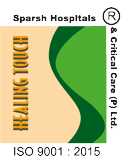Why choose Sparsh Hospitals for Pediatric Surgery?

The Department of Pediatric Surgery at Sparsh Hospitals provides specialized surgical care for infants, children, and adolescents. Our team of pediatric surgeons, anesthesiologists, and nurses are experienced in handling the unique needs of young patients, ensuring their safety and comfort. We offer a wide range of surgical services, from routine procedures to complex surgeries, using state-of-the-art technology and child-friendly environments to provide the best possible care for our young patients.
What is Pediatric Surgery?
Pediatric surgery is a medical specialty focused on the surgical treatment of diseases, injuries, and conditions in infants, children, and adolescents. Pediatric surgeons are trained to perform surgeries on young patients, taking into account their unique anatomical and physiological differences. They work closely with pediatricians, anesthesiologists, and other specialists to provide comprehensive care before, during, and after surgery.

Common Pediatric Surgical Conditions and Treatments
– Congenital Anomalies: Surgical correction of birth defects such as cleft lip and palate, congenital heart defects, and gastrointestinal malformations.
– Appendicitis: Surgical removal of the inflamed appendix, known as an appendectomy, commonly performed in children.
– Hernias: Repair of inguinal, umbilical, and other types of hernias using minimally invasive techniques.
– Tumors: Surgical removal of benign and malignant tumors in various parts of the body.
– Trauma: Emergency surgical care for injuries resulting from accidents, falls, and other traumatic events.
– Urological Conditions: Treatment of conditions such as hypospadias, undescended testes, and vesicoureteral reflux.
Diagnostic Tests in Pediatric Surgery
– Imaging Studies: X-rays, ultrasounds, CT scans, and MRIs to diagnose conditions and plan surgeries.
– Blood Tests: Assessment of overall health and detection of underlying conditions.
– Biopsy: Collection of tissue samples to diagnose tumors and other conditions.
– Endoscopy: Minimally invasive procedure to examine internal organs and collect tissue samples.
Pediatric Surgical Treatments
– Minimally Invasive Surgery: Techniques such as laparoscopy and thoracoscopy for faster recovery and less postoperative pain.
– Open Surgery: Traditional surgical approach for complex cases and large tumors.
– Emergency Surgery: Immediate surgical intervention for trauma, acute appendicitis, and other urgent conditions.
– Reconstructive Surgery: Procedures to correct congenital anomalies and restore function and appearance.
– Postoperative Care: Comprehensive care plan including pain management, wound care, and rehabilitation to ensure optimal recovery.

